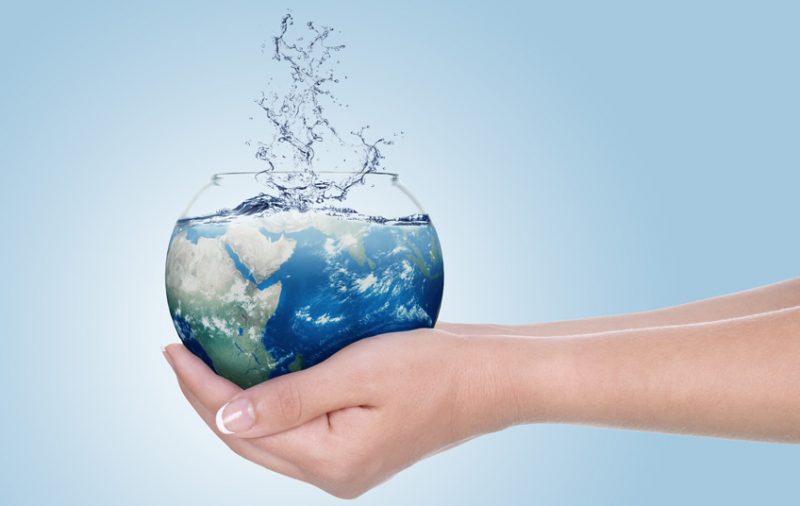

Finally, some attention from the top
Globally, India holds about 4% of the world’s freshwater and 16% of its population. But with nearly 70% of water contaminated, India ranks a dismal 120th of 122 countries in a global water quality index.
Also, as of 30 May 2019, more than 43.4% of the country was reeling under drought, according to the Drought Early Warning System (DEWS), a real-time drought monitoring platform. And a failed monsoon is one of the primary reasons for the current situation.
Waters of India
The total water resource base for India, including surface and groundwater, is 2,518 billion cubic meter (bcm). In India, only 690 bcm of 1,869 bcm (37%) surface water resources can actually be utilised because of contamination. Only 230 bcm of the 400 bcm (58%) groundwater is accessible, data on groundwater show, Niti Aayog, the government’s policy think tank, said in this 2018 report.
On the other hand, groundwater, the source of 40% of India’s water needs, is depleting at an unsustainable rate, according to NITI Aayog. This is why, India is the world’s largest groundwater extractor –accounting for 12% of global extraction.
According to official estimates, if mitigation measures are not implemented, India faces a 6% loss in its gross domestic product by 2050, when the demand for water will exceed the supply. The Niti Aayog’s report calls for “immediate action” from the states. This scarcity of water is also increasing the country’s health burden: currently, 200,000 Indians die every year due to inadequate access to safe water.
Dry Spells
India has faced a severe drought every eight or nine years, rainfall data over the past century indicate. Yet, three in five districts are not prepared for drought, said a September 2018 paper published jointly by the Indian Institutes of Technology, Indore and Guwahati.
This lack of water is also compounded by the heatwave that has gripped most states of India with temperatures crossing 50 degree Celsius mark.
At least 133 of the 634 districts that the paper studied face drought almost every year; most of them are in Chhattisgarh, Karnataka, Maharashtra and Rajasthan, said the study that assessed how efficiently districts use water when dealt with hydroclimatic disturbances.
Agriculture uses up to 80% of all water resources in the country, the Aayog’s report said, making it critical to rationalize water use in this sector. Drinking water accounts for only 4% of the water consumption in India.
Usage of efficient irrigation methods, implementation of an urban water policy to harvest rainwater in Indian cities and regulate groundwater usage, increasing the water recycling capacity are the urgent steps that India should undertake going forward.
Solutions
India has the potential to bring nearly half of its net cultivated area – 140 million hectares – under micro-irrigation. But so far, only 7.73 million hectares (mha) – drip irrigation covers 3.37 mha and sprinkler irrigation covers 4.36 mha – as against the estimated potential of 69.5 mha has been covered under micro-irrigation, said Samrat Basak, an expert on water-related issues from World Resource Institute.
“India also needs a “National Urban Water Policy which will define amongst other things what is a water smart city and provide guidelines: to harvest rainwater to its full potential, recharge the groundwater and regulate groundwater usage.” Says Himanshu Thakkar, coordinator at the South Asia Network on Dams, Rivers and People.
Performance around groundwater augmentation can significantly improve with the strengthening of groundwater regulations and strict implementation on the ground. Also, steps such as improvement of monitoring network and continuous monitoring of groundwater level and groundwater quality, strict implementation of rainwater harvesting and continuous operation and maintenance of the same will also help states manage their groundwater better.
With inputs from IndiaSpend
1. The mandate for blending Compressed Biogas (CBG) with natural gas has come into effect…
Andhra Pradesh is striving towards greening its energy sector with quite some speed. In a…
With an objective to bolster India’s green energy goals, a Tripartite Agreement has been signed…
The Union MNRE Minister Pralhad Joshi launched the Green Hydrogen Certification Scheme of India (GHCI)…
India’s energy conglomerate Bharat Petroleum Corporation Limited (BPCL) has commissioned a 5MW green hydrogen plant…
In a historical development, the European Space Agency (ESA) has successfully launched its pioneering ‘Biomass’…